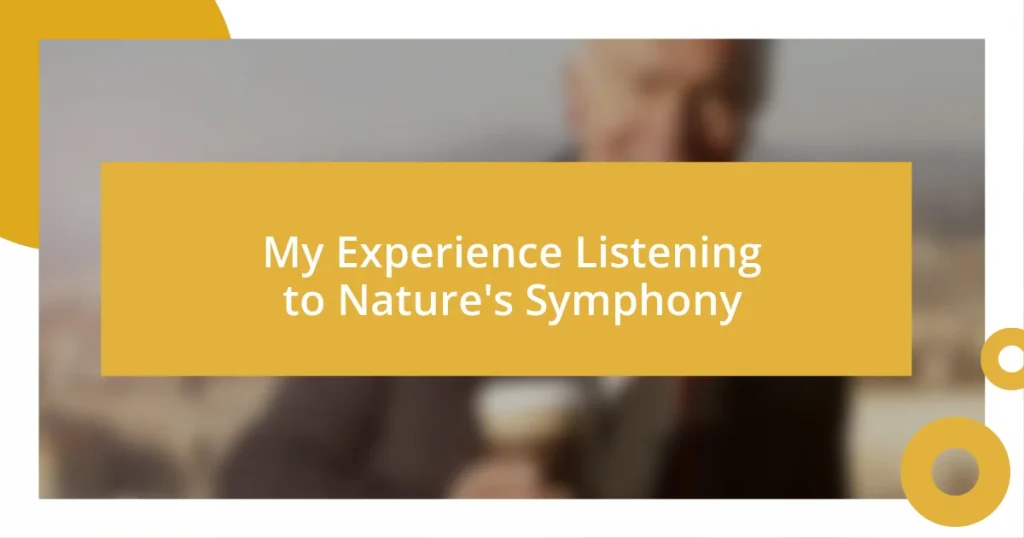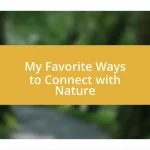Key takeaways:
- Nature’s sounds act as a natural remedy, promoting stress reduction, enhanced focus, and improved mood through mindful listening experiences.
- Finding ideal locations, such as near water or in lush forests, helps create a calming atmosphere conducive to deeper engagement with nature’s symphony.
- Practicing techniques like deep listening, reflecting through journaling, and mindful breathing can enrich the connection with nature and enhance overall well-being.
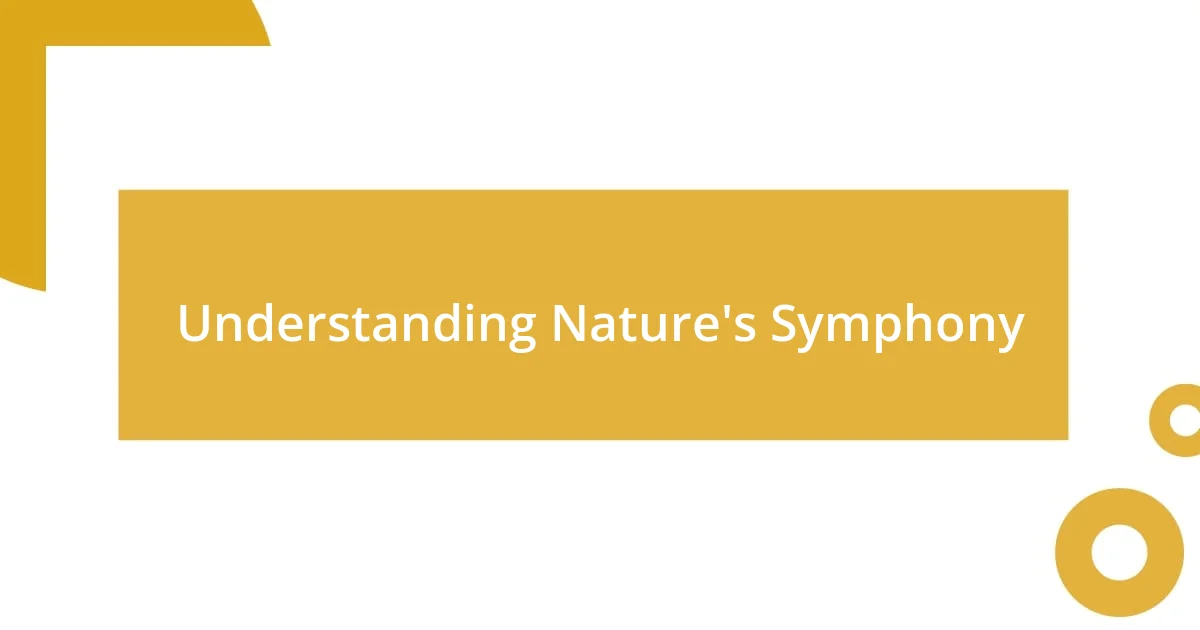
Understanding Nature’s Symphony
Have you ever paused to listen, truly listen, while on a hike or sitting in a park? I remember the first time I did this; I was surprised to realize how rich and varied nature’s soundtrack can be. The rustling leaves, a nearby stream, and birds calling to one another create a harmonious blend that instantly calms the mind and soul.
As I sat by the water’s edge, I felt that every sound had its own role in this orchestra—like different instruments contributing to a beautiful melody. For instance, the soft croaking of frogs at dusk brought a sense of peace, while the distant calls of geese ascending into the sky added excitement. It made me reflect: what if we’re all part of this symphony, each of us playing a fine note in the grand scheme of life?
Engaging with nature in this way opens a dialogue within ourselves. I found that moments of quiet reflection often accompany these experiences. Have you noticed how the stress of daily life can fade when surrounded by such beauty? In those moments, I felt a connection to something larger than myself. Nature’s symphony isn’t just about sound; it’s a reminder of our place in the world, urging us to slow down and appreciate the simple, yet profound, melodies around us.
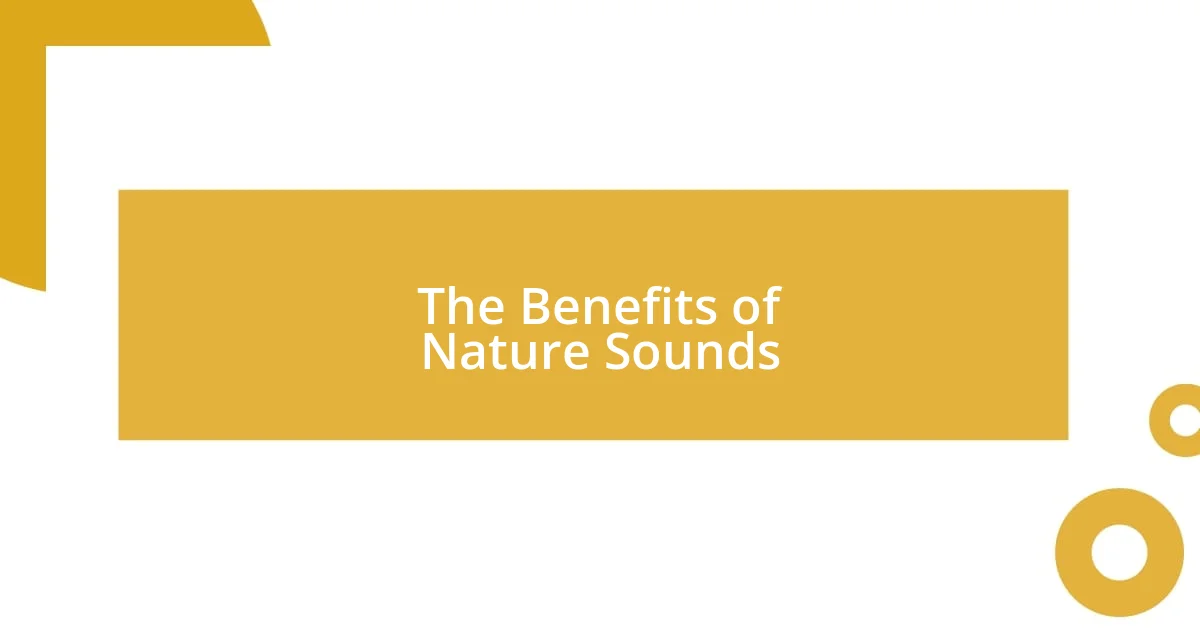
The Benefits of Nature Sounds
Listening to nature’s sounds offers numerous benefits for our mental and emotional well-being. In my experience, these sounds can reduce stress and anxiety, providing a natural remedy that feels both rejuvenating and grounding. Whenever I immerse myself in the gentle hum of cicadas or the soft rustle of tree branches swaying in the breeze, I can literally feel the tension melting away.
Moreover, nature sounds can enhance focus and creativity. I recall a time when I was struggling to concentrate while working from home. I decided to play a recording of rain falling against leaves. Soon after, I noticed my thoughts becoming clearer and my productivity skyrocketing. It was as if the rhythmic pitter-patter opened a new channel in my mind, allowing ideas to flow more freely.
Not only do these sounds promote relaxation, but they can also improve our overall mood. When I’m out on a hike and I hear the cheerful chirping of birds, it lifts my spirits instantly. This simple interaction with the environment can evoke feelings of joy and connection that often elude us in daily life. It’s truly fascinating how small shifts in our auditory landscape can have profound effects on our inner world.
| Benefit | Description |
|---|---|
| Stress Reduction | Nature sounds help lower cortisol levels, creating a calming effect on the listener. |
| Enhanced Focus | Listening to natural sounds can improve concentration and stimulate creative thinking. |
| Mood Improvement | Nature’s symphony can evoke feelings of happiness and connection, boosting overall mood. |

Finding the Right Location
Finding the right location to listen to nature’s symphony is essential for maximizing your experience. Personally, I’ve discovered that being near water—like a bubbling brook or a serene lake—creates an incredibly calming atmosphere. I recall a day spent sitting on a large rock by a river, where the sounds of water splashing harmonized beautifully with the rustling leaves above. This combination made each moment felt more alive, and I found myself entranced.
Here are some locations that I’ve found particularly conducive to enjoying nature’s offerings:
- Forest Trails: Dense greenery helps amplify softer sounds like bird calls and wind.
- Lakesides: The gentle lapping of water creates a soothing background that encourages deep relaxation.
- Mountain Tops: Elevated views not only provide stunning scenery but also the crisp air carries distinct sounds that can be both invigorating and reflective.
- Parks: Urban parks, even if they’re smaller, can be effective in providing a green refuge amidst city noise.
- Wetlands: Places where water meets land often produce a chorus of frogs and insects, offering a vibrant mix of sounds.
I’ve found that the key is to choose a place where you feel at peace. The ideal spot should inspire you to pause, breathe deeply, and tune into the magic around you. It’s in these quiet corners of the world that I’ve felt the profound energy that nature’s symphony has to offer.

Techniques for Deep Listening
To truly embrace deep listening, I find that engaging with my surroundings mindfully is crucial. One technique I often use is closing my eyes and focusing solely on the sounds around me. When I do this, I can distinguish the layers of nature’s symphony—the chirping of crickets, the whisper of the wind, and even the distant call of an owl. It’s as if I’m tuning into a radio station that broadcasts only the melodious essence of the earth.
I also recommend using a designated listening time, much like setting aside time for reading or meditation. I once dedicated a Sunday morning to sit quietly in my backyard, allowing the sounds to wash over me. I remember being pleasantly surprised by the variety of birdsong that emerged—each note seemed to tell a different story about the day. How often do we miss these intricacies in our daily lives, lost in our routines?
Another effective technique is to alternate between listening and reflecting. After immersing myself in the natural sounds, I pause to journal my thoughts and feelings. One evening, after spending time in a serene meadow, I found myself writing about the emotions the sounds evoked—fond memories from childhood, a sense of peace, and an overwhelming gratitude for nature’s beauty. This practice not only deepens my appreciation but also allows me to connect more profoundly with my experiences. What insights could you glean by reflecting on your own listening experiences?

Connecting with Your Senses
Connecting with your senses while experiencing nature can be incredibly transformative. I remember one quiet afternoon when I sat in a sun-drenched meadow, feeling the warmth absorbing into my skin. Each time the breeze brushed against my face, it felt like nature was gently reminding me to be present, to appreciate every moment unfolding around me.
As I tuned into my surroundings, I found myself captivated by the scents that drifted through the air—the earthy aroma of damp soil mingling with the sweet scent of wildflowers. Have you ever taken a deep breath and felt an overwhelming rush of gratitude for the simple beauty around you? In that moment, it was as if nature was speaking to me, whispering secrets that only the attentive could hear.
Sound plays such an essential role in this sensory connection. On one occasion, I was fortunate enough to witness a sunset chorus of birds as they settled into the trees for the night. Each distinct call echoed in harmony, creating a melody that resonated deeply within me. It struck me then how often we overlook this symphony of life. Are we too preoccupied with our smartphones or daily tasks to truly listen to what surrounds us? Taking that time to connect can awaken a sense of wonder and appreciation that enriches our lives.
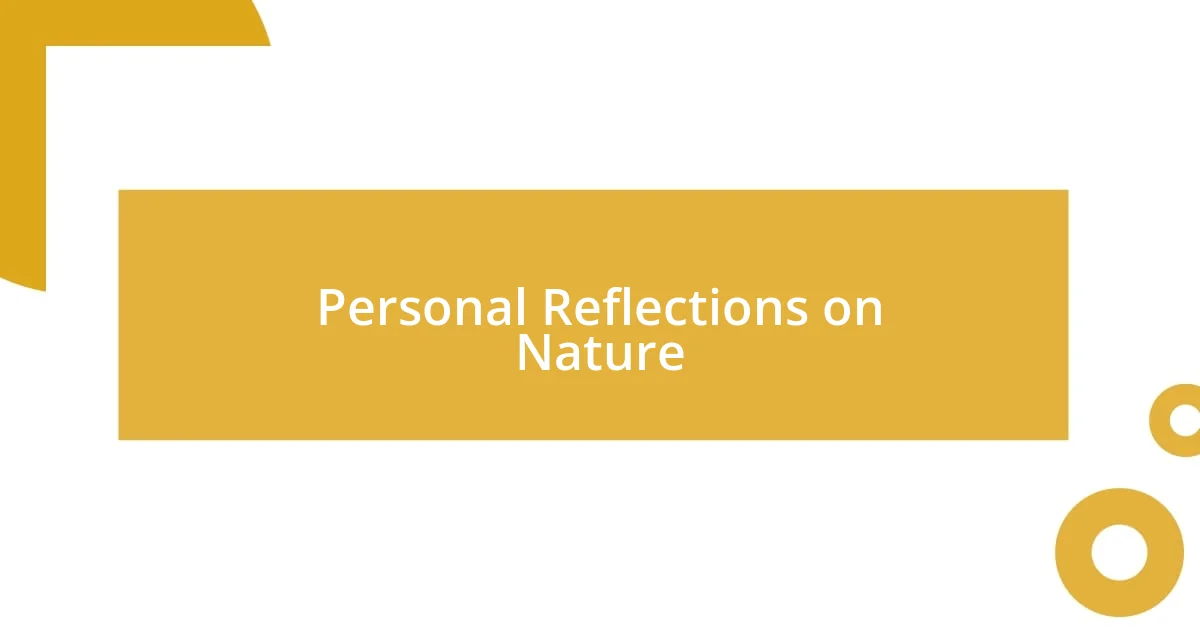
Personal Reflections on Nature
Reflecting on my experiences in nature often feels like peeling back layers of my own psyche. I vividly recall a morning spent by the lakeside, the mist dancing above the water’s surface. As I listened to the gentle lapping of the waves, I realized how this natural rhythm mirrored the heartbeat of my own being. Have you ever felt how deeply nature can resonate within you, inviting you to reconnect with your inner self?
One unforgettable evening, I was hiking through a forest when the sun began to set, casting a warm golden glow through the trees. The soft rustle of leaves became a soothing balm to my soul, and I felt an indescribable peace wash over me. In that moment, I understood that nature has a unique language—one that calms our restless minds and whispers the importance of slowing down. How often do we allow ourselves to pause and truly absorb the beauty surrounding us?
During another quiet afternoon at a local park, I noticed the laughter of children playing nearby mixed with the cheerful chatter of birds overhead. This delightful cacophony sparked a sense of joy within me, evoking memories of my own childhood explorations in the great outdoors. It’s remarkable how such simple sounds can transport us back in time and remind us of the unadulterated happiness that nature can bring. Have you ever taken a moment to appreciate how these sounds shape your experiences? They can weave a rich tapestry of feelings that enrich our lives in ways we often overlook.

Tips for Enhancing Your Experience
Paying attention to your breathing can significantly enhance your experience in nature. I’ve found that when I consciously take deep breaths, I can truly absorb the environment around me. Have you ever noticed how a longer inhale allows you to savor the scents of pine trees or fresh rain? It’s almost as if you’re drawing in the very essence of nature itself.
Another tip I advocate for is to find a comfortable spot where you can sit quietly, free from distractions. I remember a time when I snuggled into a cozy nook under a large oak tree. Sitting there, I closed my eyes and let the sounds of a nearby stream wash over me. Allowing yourself to be still can lead to unexpected moments of insight. Who knows what thoughts or feelings might arise when you take a moment to simply be?
Finally, don’t hesitate to bring a journal along to jot down your reflections. During a recent hike, I halted to scribble my thoughts about how the play of light through leaves seemed to dance in tandem with my mood. Writing helped me crystallize feelings, turning fleeting moments into lasting memories. Have you ever tried writing about your experiences in nature? It can deepen your connection, making the beauty you witness feel even richer.










